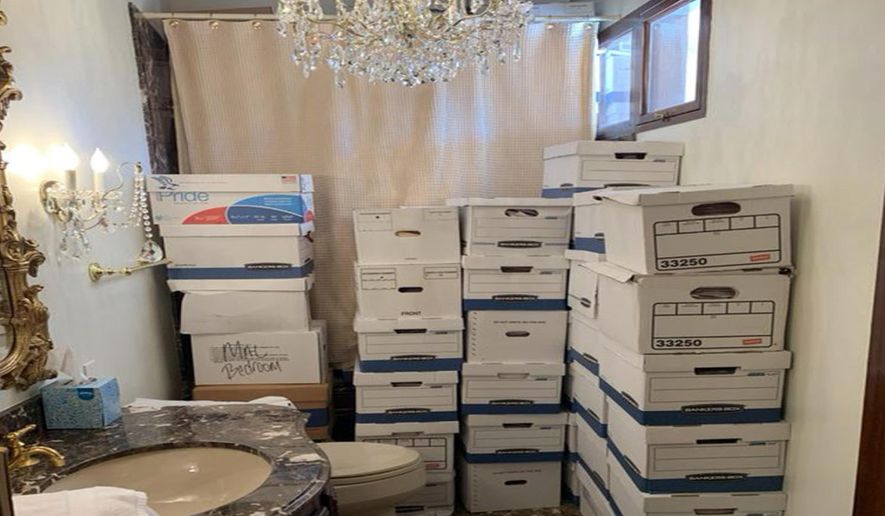Former President Donald Trump sat in a Florida courtroom Thursday as his lawyers tried to convince a federal judge that charges over sensitive government records found at Mar-a-Lago should be tossed because special counsel Jack Smith is wielding vague laws and disregarding presidential powers.
Defense lawyers said there is no clear basis for prosecutors using the Espionage Act against Mr. Trump. An indictment alleges Mr. Trump unlawfully stored presidential records at his Florida estate and obstructed archivists’ attempts to retrieve the documents.
U.S. District Court Judge Aileen Cannon told a Trump attorney that striking down a statute — as the defense is seeking — would be “quite an extraordinary step.” But she also pointedly told a prosecutor that no former president has ever been charged with mishandling classified documents.
Jay Bratt, a prosecutor with Mr. Smith’s team, responded that there has never been another situation “remotely similar to this one.”
Defense lawyer Emil Bove said ambiguity in the statute allows what he called “selective” enforcement by the Justice Department, leading to Mr. Trump being charged but enabling others to avoid prosecution.
Mr. Bove said that includes President Biden, the recent subject of a harshly critical report by special counsel Robert Hur on the president’s handling of classified information. No charges were brought against Mr. Biden.
“The court’s obligation is to strike the statute and say ‘Congress, get it right,’” Mr. Bove told Judge Cannon.
Mr. Bratt disputed that the statute was unclear.
Mr. Trump sat at the defense table at the federal court in Fort Pierce with his hands clasped, listening intently to the arguments.
Mr. Smith was also in the courtroom, but there was no visible interaction between the two men.
Mr. Trump’s attorneys and Mr. Smith’s team sparred in front of Judge Cannon one day after a judge in Georgia dismissed multiple counts of a separate criminal case against the former president.
Also Thursday, defense lawyers argued that Mr. Trump was entitled as president to keep any government records he wanted.
The Presidential Records Act says the National Archives and Records Administration receives custody of presidential records once a president leaves office.
Yet Mr. Trump says he had the leeway to negotiate which records must be returned from his Mar-a-Lago estate in southern Florida. Defense attorneys are pointing to a part of the 1978 records law that permitted presidents to designate documents as “personal.”
Prosecutors say that part of the law doesn’t apply here.
“The documents charged in the indictment are not personal records. They are not,” said David Harbach, a member of Mr. Smith’s team. “They are nowhere close to it under the definition of the Presidential Records Act.”
Judge Cannon, in her questions to lawyers, seemed inclined to have a jury decide the disputed issues.
A Trump appointee, Judge Cannon will play a key role in deciding whether to dismiss the charges before Mr. Trump even reaches trial. She may also postpone jury selection beyond the November election as the court works through pretrial matters.
The trial is set for May 20, but Judge Cannon is expected to set a new date. She launched right into legal arguments Thursday without hinting when jury selection would begin.
Prosecutors say Mr. Trump hoarded sensitive government papers at his sprawling residence in Palm Beach, which also functions as a social club, and obstructed efforts to retrieve them. Investigators raided the estate in August 2022 after archivists suspected classified documents made their way from the White House to Mar-a-Lago.
Mr. Smith secured an indictment charging Mr. Trump with more than 40 counts, including 32 counts of unauthorized retention of national security secrets; seven counts of obstructing efforts to retrieve the documents; and three counts of making false statements.
Mr. Trump faces four criminal cases while he campaigns as the presumptive GOP nominee for president.
He is scheduled to face trial on March 25 in New York on charges he falsified business records to cover up hush-money payments to porn star Stormy Daniels and two others in 2016.
New York prosecutors said Thursday they were open to delaying the start of the trial by up to 30 days to give the former president’s lawyers time to review evidence that was only recently turned over.
Mr. Smith secured a separate indictment charging Mr. Trump with conspiring against the U.S. and its voters in attempts to overturn the 2020 election results. The case in Georgia says Mr. Trump and others violated state racketeering laws while challenging Mr. Biden’s win in the state.
Judge Scott McAfee, presiding in Atlanta, dismissed three of the 13 counts against Mr. Trump on Wednesday, ruling prosecutors weren’t specific enough in detailing the charges.
A felony conviction could be a drag on Mr. Trump’s presidential bid.
Mr. Trump is using the situation to consolidate his base of support, however, saying voters view the cases as a political witch hunt.
The politics around the documents case are complicated by Mr. Hur’s report, which said Mr. Biden stored classified documents after his time as vice president, including records about military decisions on Afghanistan.
Mr. Trump says Mr. Biden is guilty of far worse than he is, only to duck prosecution, though Mr. Smith chafed at the comparison.
“Most notably, Trump, unlike Biden, is alleged to have engaged in extensive and repeated efforts to obstruct justice and thwart the return of documents bearing classification markings,” Mr. Smith’s team wrote in a February court filing. “And the evidence concerning the two men’s intent — whether they knowingly possessed and willfully retained such documents — is also starkly different, as reflected in the Hur Report’s conclusion that ’the evidence falls short of establishing Mr. Biden’s willful retention of the classified Afghanistan documents beyond a reasonable doubt.’”
• This story is based in part on wire service reports.
• Tom Howell Jr. can be reached at thowell@washingtontimes.com.




Please read our comment policy before commenting.